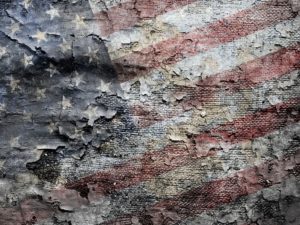Will the Nation Collapse in a Post-Christian Era?

Due to a growing alarm over dwindling church attendance in the United States, a sort of entry-level anti-secularism is a frequent presence in the online Christian Post. It takes the form of short articles introducing conservative Christian readers to the standard anti-secularist arguments: without God no morality is possible, without a church community your children may become low-achievers, and American society will wither without a Judeo-Christian foundation.
This last topic was addressed in a post on April 4, “Secularism Can’t Sustain a Moral Order,” by pastor and professor Kevin Shrum, and it seems to warrant a brief response.
In this piece Shrum asserts that secular ethics is determined by “a plethora of personal feelings and whims” that renders social unity impossible. Because of this, “the essential doctrine of secularism is the ill-defined notion of tolerance.” And in the thrall of all this, secularists have somehow become a powerful force, dead set on overthrowing the nation’s established moral order—an order built by the founders out of a Judeo-Christian tradition.
As is usual in articles of this sort, they enjoy a ring of credibility because they are partially true.
Yes, emotions play a role in secular ethics, as explained by the emotive theory of ethics—that you can’t derive an “ought” from an “is” and therefore our values are rooted in our emotions. But being social primates, we have common emotions that arise from common drives and needs. So our rationality is directed toward common ends, which definitely makes unity possible.
Yes, secularists value tolerance. But that’s just civility in action. It also allows minority and disenfranchised voices to be heard, thereby enriching all and allowing for new solutions to old problems.
And yes, to the degree that certain aspects of the established moral order have proved oppressive, secularists want those parts dissolved. Such oppressive parts include racism, sexism, censorship, governmental privileging of Christianity, and so on.
From the secular viewpoint, all of these efforts are toward improvement of a society that hasn’t arrived at perfection—and all of those who stand by the old verities seem dead set on stasis or retreat.
But if Shrum thinks secularism will fail to sustain a social order in a post-Christian era, his central argument is his own undoing. He writes:
While many of the “framers and founders” were not explicitly Christian, they did decide to hang their moral hat on an intellectual structure that was not only rooted in natural and common law, but in a spiritual and moral order that allowed for human flourishing.
Yep, they did that. But Shrum would have us believe this structure was either based on Christianity or used ideas smuggled from it.
Well, the nation’s founders were certainly well versed in Christianity. So of course they were influenced by it, just as early Christians were influenced by ancient philosophy and religion. But the founders were also well versed in Greco-Roman, Renaissance, and Enlightenment philosophy. And these latter they used to oppose the leading Christian excesses of their age, most famously the divine right of kings, theocracy, and religious war.
So what the founders and their successors created wasn’t a Christian structure but rather something Robert N. Bellah termed American civil religion (although it might more simply be called Americanism). It was developed as a cultural glue to hold this diverse nation together. And it is immediately and acutely noticed by foreign visitors and immigrants, who are struck by our flag flying, patriotic singing, and regular recitation of the Pledge of Allegiance. British journalist Gilbert K. Chesterton wrote in 1922 that the United States is “the only nation in the world that is founded on a creed. That creed is set forth with dogmatic and even theological lucidity in the Declaration of Independence.” And in our national life we make pilgrimages to America’s shrines, view its relics, celebrate its holy days, and show respect to its saints and martyrs. This is true whether we are conservative or liberal.
So if a unifying “religion” is needed to maintain the social order (although it doesn’t seem so necessary in an increasingly secular Europe) we in the United States have it in abundance. Traditional religion can fall off the edge of the earth and this nation will go on just fine—a point I made in an article, “The Religious Character of American Patriotism,” in the November/December 1987 issue of the Humanist and restated earlier this month in a talk of the same title for the Humanist Community of the Silicon Valley in San Jose, California.
What, then, is Shrum trying to warn his readers about? That the United States will cease to be if his religion loses its cultural hegemony? He might better warn them that it won’t—and that it could well get a lot better, rendering traditional faith obsolete.
